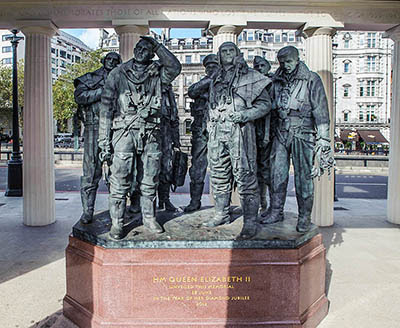March 10, 1945 - Prisoners of War
After parachuting to safety after the Dessau raid, Douglas Hicks, Gerard Kelleher, Gordon Nicol and David Yemen were quickly rounded up and held at a Luftwaffe facility in Magdeburg, Germany where they had the opportunity to discuss the events of the evening of the raid. Between the four survivors, they were able to determine what had happened when the plane exploded. Hicks described the events:
After the pilot had yelled Jump, Jump, Jump, the crew up front donned their parachutes and proceeded to the exit that was on the floor just back from the nose of the aircraft. The bomb aimer was first out and was followed by the wireless operator. The navigator was standing in line to exit and the pilot was just getting out of his seat. The aircraft then blew up and the navigator was blown through the plastic canopy that covered the cockpit, shattering it, no doubt it was the aircraft exploding that freed me from the aircraft when I had prepared to exit the aircraft. The navigator maintained consciousness and was able to open his chute. When his chute opened the impact tore off his flying boots, a common occurrence when the flight crew jumped. It seems they were always strapped on too loosely, more for comfort than practicability. Now he was walking in his stocking feet. My boots survived the jump and I was able to give him the slippers that I wore as part of my electrically heated suit.
Hicks was taken to a German hospital to see a doctor for his burns, where he learned that although the burns were causing his eyes to swell shut, he had not sustained any permanent damage to his eyes. Nicol sustained some type of injury though it is not recorded (possibly ankle sprain). Astoundingly, Kelleher and Yemen were uninjured.
Arrangements were made by Luftwaffe authorities to transfer Hicks, Kelleher, Nicol and Yemen to Dulag Luft, the prisoner-of-war transit camp for Allied airmen. Dulag Luft was located approximately 350 km SW of Magdeburg, a journey which involved several days travel.
After the pilot had yelled Jump, Jump, Jump, the crew up front donned their parachutes and proceeded to the exit that was on the floor just back from the nose of the aircraft. The bomb aimer was first out and was followed by the wireless operator. The navigator was standing in line to exit and the pilot was just getting out of his seat. The aircraft then blew up and the navigator was blown through the plastic canopy that covered the cockpit, shattering it, no doubt it was the aircraft exploding that freed me from the aircraft when I had prepared to exit the aircraft. The navigator maintained consciousness and was able to open his chute. When his chute opened the impact tore off his flying boots, a common occurrence when the flight crew jumped. It seems they were always strapped on too loosely, more for comfort than practicability. Now he was walking in his stocking feet. My boots survived the jump and I was able to give him the slippers that I wore as part of my electrically heated suit.
Hicks was taken to a German hospital to see a doctor for his burns, where he learned that although the burns were causing his eyes to swell shut, he had not sustained any permanent damage to his eyes. Nicol sustained some type of injury though it is not recorded (possibly ankle sprain). Astoundingly, Kelleher and Yemen were uninjured.
Arrangements were made by Luftwaffe authorities to transfer Hicks, Kelleher, Nicol and Yemen to Dulag Luft, the prisoner-of-war transit camp for Allied airmen. Dulag Luft was located approximately 350 km SW of Magdeburg, a journey which involved several days travel.
In the meantime, news would reach the next of kin of each member of the Harris crew aboard ME428 the evening of March 7th: Harris, Hicks, Kelleher, Nicol, Robinson, Smith and Yemen. Unbeknownst to their families and their squadron, Robert Harris, Kenneth Smith and Eric Robinson had been killed and the remaining crew were now POWs. It must have been a harrowing wait for the families. With the lack of available information, the families would have to wait at least a month before hearing of the fate of their loved ones.

Comments
Post a Comment